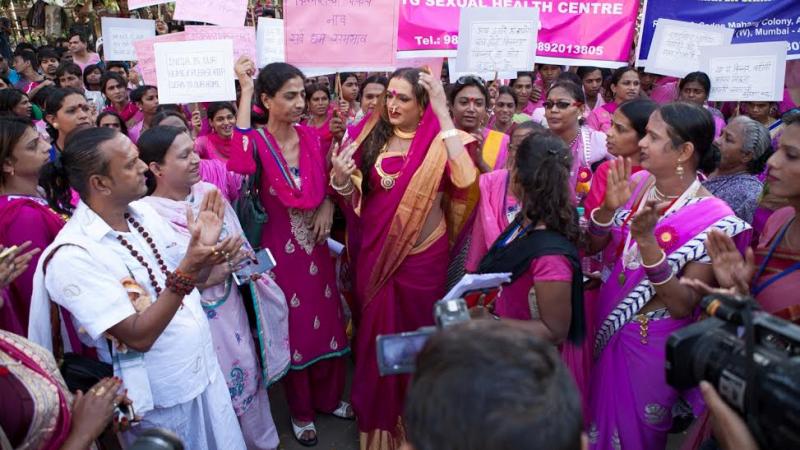Astitva Trust defiende los derechos de los grupos de las minorías sexuales
En abril de 2014, el Astitva Trust y su Presidenta Laxmi Narayan Tripathi, destacada activista por los derechos de las personas trans*, presentaron una petición apoyando el reconocimiento de un tercer género por parte de la Corte Suprema de la India. Fue una decisión histórica y a través de ella la Corte reconoció todos los derechos constitucionales a las personas trans*, afirmando que: «Todo ser humano tiene derecho a elegir su género».
Pero aunque para la ley las personas trans* son ciudadanas en pie de igualdad, todavía se enfrentan a una discriminación social extrema. Astitva Trust es una organización comunitaria de minorías sexuales (en su mayoría hijras[1]) cuyo objetivo es erradicar el estima y la discriminación contra las personas LGBTQ* y particularmente contra la comunidad trans*. Trabaja con grupos de las minorías sexuales, defiende sus derechos, promueve su salud y su bienestar integral, y ayuda a mejorar su calidad y sus estándares de vida.

Entre los objetivos de Astitva se cuentan generar conciencia y difundir conocimientos acerca del VIH, el SIDA y otras enfermedades de transmisión sexual entre las minorías sexuales, promover el sexo más seguro, e incrementar el acceso a servicios de salud sexual comunitaria amigables. Hasta el momento, hay 4652 personas trans* registradas en Astitva y la organización mantiene contacto con 56 organizaciones trans* de la India, a las que apoya en numerosos aspectos.
Astitva es una de las fundadoras de la Integrated Network for Sexual Minorities [Red Integrada de Minorías Sexuales] cuyo consejo directivo integra; también es fundadora del Maharashtra Transgender Welfare Board [Comité para el Bienestar de la Población Trans* en Maharashtra], e integrante de su grupo de trabajo; y forma parte de la Asia - Pacific Transgender Network [Red Trans* de Asia y el Pacífico], y de la Asia Pacific Network of Sex Workers [Red de Trabajadoras/es Sexuales de Asia y el Pacífico].
En abril de 2015 y junto con el parlamentario Trichy Shiva, Astitva trabajó para lograr una histórica aprobación unánime del Proyecto de Ley por los Derechos de las Personas Trans* en la Rajya Sabha,[2] que reconoce la igualdad de derechos para las personas tras*. El paso siguiente es lograr su aprobación por parte de la Lok Sabha[3], para que se convierta en ley.
Escucha la charla de TEDx de Laxmi Narayan Tripathi (en inglés)
[1] Hijra es un término que se utiliza particularmente en la India para referirse a una persona trans* [2] Cámara Alta del Parlamento de la India [3] Cámara Baja del Parlamento de la India

